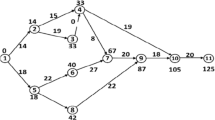Abstract
The time-cost trade-off problem is a specific type of the project scheduling problem which studies how to modify project activities so as to achieve the trade-off between the completion time and the project cost. In real projects, the trade-off between the project cost and the completion time, and the uncertainty of the environment are both considerable aspects for managers. In this paper, three new fuzzy time-cost trade-off models are proposed, in which credibility theory is applied to describe the uncertainty of activity duration times. A searching method by integrating fuzzy simulation and genetic algorithm is produced to search the quasi-optimal schedules under some decision-making criteria. The purpose of the paper is to reveal how to obtain the optimal balance of the completion time and the project cost in fuzzy environments.
Similar content being viewed by others
References
Azaron A., Perkgoz C., Sakawa M. (2005) A genetic algorithm approach for the time-cost trade-off in PERT networks. Applied Mathematics and Computation 168(2): 1317–1339
Butcher W. S. (1967) Dynamic programming for project cost-time curve. Journal of Construction Division 93(C01): 59–73
Chanas S., Kamburowski J. (1981) The use of fuzzy variables in PERT. Fuzzy Sets and Systems 5(1): 11–19
Charnes A., Cooper W. W. (1959) Chance-constrained programming. Management Science 6: 73–79
Charnes A., Cooper W. W. (1962) A network interpretation and a direct sub-dual algorithm for critical path scheduling. Journal of Industrial Engineering 13: 213–219
Chua D. K. H., Chan W. T., Govindan K. (1997) A time-cost trade-off model with resource consideration using genetic algorithm. Civil Engineering Systems 14: 291–311
Eshtehardian E., Afshar A., Abbasnia R. (2008) Time-cost optimization: Using GA and fuzzy sets theory for uncertainties in cost. Construction Management and Economics 26(7): 679–691
Feng C. W., Liu L., Burns S. A. (1997) Using genetic algorithms to solve construction time-cost trade-off problems. Journal of Construction Engineering and Management 11(3): 184–189
Freeman R. J. (1960) A generalized network approach to project activity sequencing. IRE Transactions on Engineering Management 7(3): 103–107
Ghazanfari M., Shahanaghi K., Yousefli A. (2008) An application of possibility goal programming to the time-cost trade off problem. Journal of Uncertain Systems 2(1): 22–28
Ghazanfari M., Yousefli A., Ameli M. S. J., Bozorgi-Amiri A. (2009) A new approach to solve time-cost trade-off problem with fuzzy decision variables. The International Journal of Advanced Manufacturing Technology 42: 408–414
Goldratt E. (1997) Critical chain. The North River Press, Great Barrington, MA
Golenko-Ginzburg D., Gonik A. (1997) Stochastic network project scheduling with non-consumable limited resources. International Journal of Production Economics 48(1): 29–37
Gutjahr W. J., Strauss C., Wagner E. (2000) A stochastic branch-and-bound approach to activity crashing in project management. INFORMS Journal on Computing 12(2): 125–135
Hapke M., Jaszkiewicz A., Slowinski R. (1994) Fuzzy project scheduling system for software development. Fuzzy Sets and Systems 67(11): 101–117
Hapke M., Slowinski R. (1993) A DSS for resource-constrained project scheduling under uncertainty. Journal of Decision Systems 2(2): 111–128
Hapke M., Slowinski R. (1996) Fuzzy priority heuristics for project scheduling. Fuzzy Sets and Systems 83(3): 291–299
Hapke M., Slowinski R. (2000) Fuzzy set approach to multi-objective and multi-mode project scheduling under uncertainty. In: Hapke M., Slowinski R. (eds) Scheduling under fuzziness. Physica-Verlag, Heidelberg, pp 197–221
Jin C., Ji Z., Lin Y., Zhao Y., Huang Z. (2005) Research on the fully fuzzy time-cost trade-off based on genetic algorithms. Journal of Marine Science and Application 4(3): 18–23
Kaufmann A., Gupta M. M. (1988) Fuzzy mathematical models in engineering and management science. Amsterdam, North-Holland
Ke H., Liu B. (2005) Project scheduling problem with stochastic activity duration times. Applied Mathematics and Computation 168(1): 342–353
Ke H., Liu B. (2010) Fuzzy project scheduling problem and its hybrid intelligent algorithm. Applied Mathematical Modelling 34(2): 301–308
Ke H., Ma W., Ni Y. (2009) Optimization models and a GA-based algorithm for stochastic time-cost trade-off problem. Applied Mathematics and Computation 215: 308–313
Kelley J. E. Jr. (1961) Critical path planning and scheduling mathematical basis. Operations Research 9(3): 296–320
Laslo Z. (2003) Activity time-cost tradeoffs under time and cost chance constraints. Computers & Industrial Engineering 44: 365–384
Leu S. S., Chen A. T., Yang C. H. (2001) A GA-based fuzzy optimal model for construction time-cost trade-off. International Journal of Project Management 19: 47–58
Liu B. (1997) Dependent-chance programming: A class of stochastic programming. Computers & Mathematics with Applications 34(12): 89–104
Liu B., Iwamura K. (1998a) Chance constrained programming with fuzzy parameters. Fuzzy Sets and Systems 94: 227–237
Liu B., Iwamura K. (1998b) A note on chance constrained programming with fuzzy coefficients. Fuzzy Sets and Systems 100: 229–233
Liu B. (1999) Dependent-chance programming with fuzzy decisions. IEEE Transactions on Fuzzy Systems 7: 354–360
Liu B. (2002) Theory and practice of uncertain programming. Physica-Verlag, Heidelberg
Liu B., Liu Y. K. (2002) Expected value of fuzzy variable and fuzzy expected value models. IEEE Transactions on Fuzzy Systems 10: 445–450
Liu B. (2004) Uncertainty theory: An introduction to its axiomatic foundations. Springer-Verlag, Berlin
Liu B. (2006a) A survey of credibility theory. Fuzzy Optimization and Decision Making 5: 387–408
Liu Y. K. (2006b) Convergent results about the use of fuzzy simulation in fuzzy optimization problems. IEEE Transactions on Fuzzy Systems 14: 295–304
Long L. D., Ohsato A. (2008) Fuzzy critical chain method for project scheduling under resource constraints and uncertainty. International Journal of Project Management 26(6): 688–698
Özdamar L., Alanya E. (2001) Uncertainty modelling in software development projects (with case study). Annals of Operations Research 102(1–4): 157–178
Phillips S. Jr., Dessouky M. I. (1997) Solving the project time/cost tradeoff problem using minimal cut concept. Management Science 24(4): 393–400
Prade H. (1979) Using fuzzy set theory in a scheduling problem: A case study. Fuzzy Sets and Systems 2(2): 153–165
Siemens N. (1971) A simple CPM time-cost trade-off algorithm. Management Science 17(6): 354–363
Talbot F. B. (1982) Resource-constrained project scheduling with time-resource tradeoffs: The non-preemptive case. Management Science 28: 1197–1210
Wang J. R. (1999) A fuzzy set approach to activity scheduling for product development. Journal of the Operational Research Society 50: 1217–1228
Wang J. R. (2002) A fuzzy project scheduling approach to minimize schedule risk for product development. Fuzzy Sets and Systems 127(2): 99–116
Wollmer R. D. (1985) Critical path planning under uncertainty. Mathematical Programming Study 25: 164–171
Zadeh L. A. (1965) Fuzzy sets. Information and Control 8: 338–353
Zadeh L. A. (1978) Fuzzy sets as a basis for a theory of possibility. Fuzzy Sets and Systems 1: 3–28
Zahraie B., Tavakolan M. (2009) Stochastic time-cost-resource utilization optimization using nondominated sorting genetic algorithm and discrete fuzzy sets. Journal of Construction Engineering and Management 135: 1162–1171
Zheng D. X. M., Ng S. T. (2005) Stochastic time-cost optimization model incorporating fuzzy sets theory and nonreplaceable front. Journal of Construction Engineering and Management 131(2): 176–186
Author information
Authors and Affiliations
Corresponding author
Rights and permissions
About this article
Cite this article
Ke, H., Ma, W., Gao, X. et al. New fuzzy models for time-cost trade-off problem. Fuzzy Optim Decis Making 9, 219–231 (2010). https://doi.org/10.1007/s10700-010-9076-z
Published:
Issue Date:
DOI: https://doi.org/10.1007/s10700-010-9076-z




